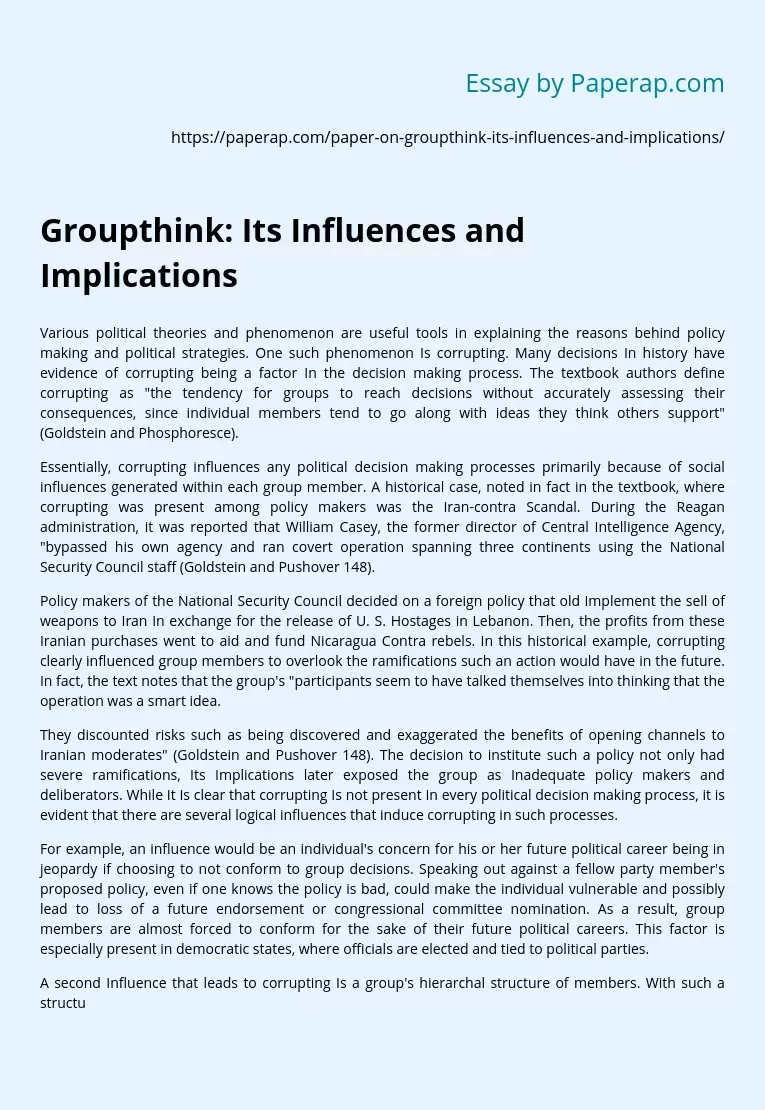Various political theories and phenomenon are useful tools in explaining the reasons behind policy making and political strategies. One such phenomenon Is corrupting. Many decisions In history have evidence of corrupting being a factor In the decision making process. The textbook authors define corrupting as “the tendency for groups to reach decisions without accurately assessing their consequences, since individual members tend to go along with ideas they think others support” (Goldstein and Phosphoresce).
Essentially, corrupting influences any political decision making processes primarily because of social influences generated within each group member.
A historical case, noted in fact in the textbook, where corrupting was present among policy makers was the Iran-contra Scandal. During the Reagan administration, it was reported that William Casey, the former director of Central Intelligence Agency, “bypassed his own agency and ran covert operation spanning three continents using the National Security Council staff (Goldstein and Pushover 148).
Policy makers of the National Security Council decided on a foreign policy that old Implement the sell of weapons to Iran In exchange for the release of U.
S. Hostages in Lebanon. Then, the profits from these Iranian purchases went to aid and fund Nicaragua Contra rebels. In this historical example, corrupting clearly influenced group members to overlook the ramifications such an action would have in the future. In fact, the text notes that the group’s “participants seem to have talked themselves into thinking that the operation was a smart idea.
They discounted risks such as being discovered and exaggerated the benefits of opening channels to Iranian moderates” (Goldstein and Pushover 148). The decision to institute such a policy not only had severe ramifications, Its Implications later exposed the group as Inadequate policy makers and deliberators. While It Is clear that corrupting Is not present In every political decision making process, it is evident that there are several logical influences that induce corrupting in such processes.
For example, an influence would be an individual’s concern for his or her future political career being in jeopardy if choosing to not conform to group decisions. Speaking out against a fellow party member’s proposed policy, even if one knows the policy is bad, could make the individual vulnerable and possibly lead to loss of a future endorsement or congressional committee nomination. As a result, group members are almost forced to conform for the sake of their future political careers. This factor is especially present in democratic states, where officials are elected and tied to political parties.
A second Influence that leads to corrupting Is a group’s hierarchal structure of members. With such a structure, the group possesses one dominating leader. This leader not only proposes the policies during decision making processes, he hermetically would determine to implement policies or to discard policies that he did not prefer. Walt sun a leader In power alerting group echelons, toner group members neither have the opportunity to speak out against flawed policies, nor do they have the influence to affect a change in the leader’s policy.
Lastly, another influence that connects the group decision making process to corrupting is that of general group pressure to comply or conform to the group. In fact, “Pressures internal to the group result in an overriding concern for maintaining a sense of amiable in-group” (Smith 117). In one sense, this can be compared to arms of peer pressure in high school settings. Here group members are simply influenced to not sway from the group by internal yet silent pressures to comply. These can result from concern for popularity among other members or one’s personal image within the group.
Speaking out against a policy, which most members are in agreement to, could create a negative image of a person who is rebellious, opinionated, and frank in expressing their views. While there are many possible influences and factors that result in corrupting during a group decision making process, all lead to the same implications and tuitions. Simply put corrupting “tends to result in bad policy making” (Smith 117). These polices can also be described as inefficient, potentially dangerous for the state, unintelligent and impractical.
Because of corrupting, it is clear that risks that were discounted in the deciding process actually are completely overlooked and the policy is initiated, despite such critical risks. Finally, Smith notes that corrupting is “likely to result in irrational and dehumidifying actions directed against out groups” (Smith 117). In facing possible criticisms and public speculation, one would think this implication alone would encourage group members to speak against poor policy proposals. In conclusion, corrupting presents an issue that questions the credibility of policy makers, especially in democratic settings.
It is evident that corrupting influences many political decision making processes primarily because of social influences generated within each group member. It is important to note, however, that corrupting is not always present in group deliberations. Nevertheless, the implications of corrupting are truly significant and impact not only individual group embers and the group in its entirety, but also the state and its citizens. Works cited 1. Joshua S. Goldstein and Jon C. Pushover 2006. International Relations (2006-07 Edition).
Groupthink: Its Influences And Implications. (2017, Nov 01). Retrieved from https://paperap.com/paper-on-groupthink-its-influences-and-implications/

